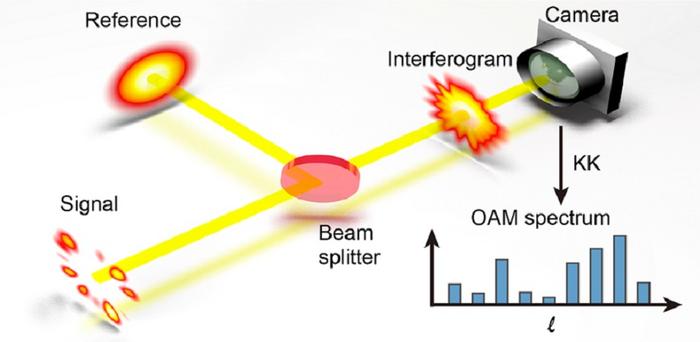Structured light waves with spiral phase fronts carry orbital angular momentum (OAM), attributed to the rotational motion of photons. Recently, scientists have been using light waves with OAM, and these special “helical” light beams have become very important in various advanced technologies like communication, imaging, and quantum information processing. In these technologies, it’s crucial to know the exact structure of these special light beams. However, this has proven to be quite tricky.

Credit: Z. Lin, J. Hu, et al., doi 10.1117/1.AP.5.3.036006.
Structured light waves with spiral phase fronts carry orbital angular momentum (OAM), attributed to the rotational motion of photons. Recently, scientists have been using light waves with OAM, and these special “helical” light beams have become very important in various advanced technologies like communication, imaging, and quantum information processing. In these technologies, it’s crucial to know the exact structure of these special light beams. However, this has proven to be quite tricky.
Interferometry — superimposing a light field with a known reference field to extract information from the interference — can retrieve OAM spectrum information using a camera. As the camera only records the intensity of the interference, the measurement technique encounters additional crosstalk known as “signal-signal beat interference” (SSBI), which complicates the retrieval process. It’s like hearing multiple overlapping sounds, making it difficult to distinguish the original notes.
In a recent breakthrough reported in Advanced Photonics, researchers from Sun Yat-sen University and École Polytechnique Fédérale de Lausanne (EPFL) used a powerful mathematical tool called the Kramers-Kronig (KK) relation, which helps with understanding and solving the problem. This tool enabled them to untangle the complex helical light pattern from the camera’s intensity-only measurements for single-shot retrieval in simple on-axis interferometry. Exploring the duality between the time-frequency and azimuth-OAM domains, they apply the KK approach to investigate various OAM fields, including Talbot self-imaged petals and fractional OAM modes.
The new measurement technique has great potential for advancing technologies that rely on these special light patterns. According to corresponding author Jianqi Hu, now a postdoc at Laboratoire Kastler Brossel, Ėcole Normale Supérieure, France, “The proposed method can also be generalized for OAM beams with complex radial structures, making it a powerful technique for real-time measurement of structured light fields, simply by a snapshot with a camera.”
Compared to conventional on-axis interferometry, the KK method demonstrated by the researchers not only accelerates the measurement but also makes it much simpler and cost-effective. Thanks to this new technique, scientists have gained a powerful means to unlock the secrets of structured light waves with OAM. This breakthrough has the potential to revolutionize various technologies, paving the way for exciting advancements in the field of structured light in the near future.
Read the Gold Open Access article by Z. Lin, J. Hu et al, “Single-shot Kramers–Kronig complex orbital angular momentum spectrum retrieval,” Adv. Photon. 5(3) 036006 (2023), doi 10.1117/1.AP.5.3.036006.
Journal
Advanced Photonics
DOI
10.1117/1.AP.5.3.036006
Article Title
Single-shot Kramers–Kronig complex orbital angular momentum spectrum retrieval
Article Publication Date
12-Jun-2023



